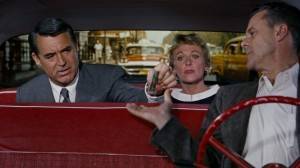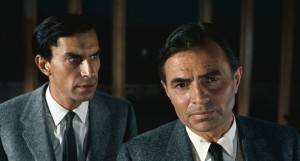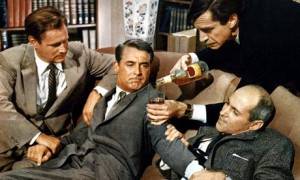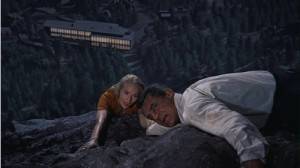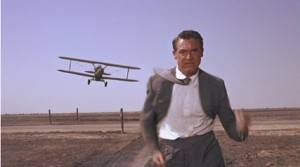North by Northwest
After his intensely personal psychological thriller Vertigo received mixed reviews due to its length and obsessive attention to detail Hitchcock set out to follow it with a fast paced, action packed, stylish, comic, chase picture to end all chase pictures. Screenwriter Ernest Lehman wonderfully parodies and trumps all of Hitch’s previous films of the 1950s making North by Northwest the quintessential ironic comedy thriller.
The success of the film is largely due to the effortlessly charming and hilarious star performance by Cary Grant as the hapless Madison Avenue advertising executive Roger Thornhill, a bachelor approaching middle age and stuck in a rut, juggling a routine job between lunch dates with his doting mother and the worry of gaining a few extra pounds each year, he is cruising through life unencumbered by real responsibility or commitment; that is until he is mistaken for a government agent by a gang of foreign spies headed by the suavely sinister Phillip Vandamm played by James Mason.
What ensues is the prototype Hollywood action comedy in which we see the reluctant hero Thornhill’s comfortable life turned upside down as he is chased across America. Cary Grant plays the part with such utter bemusement that you empathise totally with his predicament, however he is also able to subtly send up his own on-screen persona which heightens the comedy. The scene where the bad guys force him to drink a whole bottle of whisky and then put him behind the wheel of a car is a case in point, as is Thornhill’s attempt to sober up and try to explain what’s going on to the police.
Eva Marie Saint provides the love interest as Eve Kendall, an undercover agent who appears to be Vandamm’s lover but seduces Thornhill on a train bound for Chicago in a scene packed with double entendre and repressed sexuality. Eve’s true allegiances help to propel the narrative as we realise that Thornhill has fallen in love with her and finally found someone to commit to and take responsibility for but then inadvertently blows her cover to Vandamm and puts her in jeopardy setting up the final chase across Mount Rushmore and specifically President Lincoln’s nose, a set piece Hitchcock had been dying to film for many years.
North by Northwest looks incredibly good for its years on Blu-ray sporting a pristine full 1080p/VC-1 encoded vibrant picture and a Dolby TrueHD 5.1 soundtrack which, surprisingly for a film of its age, are demo quality especially in the iconic Crop Duster sequence. The movie’s appeal will long endure because of the universal themes of mistaken identity, innocence overcoming evil and love prevailing in the face of adversity, delivered with plenty of good humour and genuine wit; it may not be Hitchcock’s most complex thriller but it’s certainly one of his most entertaining.

